Vision
Our Vision is to be a center of excellence in IT education, training and research, aiming to wards carrying out advanced research and development in information and software technologies, and in leveraging IT in specific domain areas enabling students to become innovators and entrepreneurs.
Mission
- To be a department of excellence in technical education, widely known for the development of competent and socially responsible IT professionals, entrepreneurs and researchers.
- To promote professionals with knowledge and understanding, by providing them with latest developments in Computer Applications so that they contribute not only to the progress of software and its applications but even encompass the entire domain of computer technology.
- To impart quality education for long lasting development and opportunity in an extensive career in the various fields of Computer science/ Information Technology.
- To increase innovative learning to the needs of Industry and Society
- To be the source of bringing out globally competent pioneering computing professionals, researchers, innovators and entrepreneurs.
Programme Educational Objectives (PEOs)
PROGRAM EDUCATIONAL OBJECTIVES (PEO)
PEO1: To learn the formal and real time applications using the computer programming and the design principle.
PEO2: To experience their software skills with their creative design, develop team culture and to have effective communication in their work.
PEO3: To empower and inculcate entrepreneurship and managerial skills among the students in finding innovative solutions to the real-world problems in collaboration with industry and professional societies.
PEO4: Students exhibit effective work ethics and be able to adapt to the challenges of a dynamic job environment and publish their research finding in indexed conferences and Journals
Programme Outcomes (POs) & Programme Specific Outcomes(PSOs)
PROGRAM OUTCOME (PO)
PO1: Computational Knowledge: Apply knowledge of computing fundamentals, computing specialization, mathematics, and domain knowledge appropriate for the computing specialization to the abstraction and conceptualization of computing models from defined problems
and requirements.
PO2:Problem Analysis: Identify, formulate, research literature, and solve complex computing problems reaching Substantiated conclusions using fundamental principles of mathematics, computing sciences, and relevant domain disciplines.
PO3: Design /Development of Solutions: Design and evaluate solutions for complex computing problems, and design and evaluate systems, components, or processes that meet specified needs with appropriate consideration for public health and safety, cultural, societal, and
environmental considerations.
PO4: Conduct Investigations of Complex Computing Problems: Use research-based knowledge and research methods including design of experiments, analysis and interpretation of data, and synthesis of the information to provide valid conclusions.
PO5: Modern Tool Usage: Create, select, adapt and apply appropriate techniques, resources, and modern computing tools to complex computing activities, with an understanding of the limitations.
PO6: Professional Ethics: Understand and commit to professional ethics and cyber regulations, responsibilities, and norms of professional computing practice.
PO7: Life-long Learning: Recognize the need, and have the ability, to engage in independent learning for continual Development as a computing professional.
PO8: Project management and finance: Demonstrate knowledge and understanding of the computing and management Principles and apply these to one’s own work, as a member and leader in a team, to Manage projects and in multidisciplinary environments.
PO9: Communication Efficacy: Communicate effectively with the computing community, and with society at large, about complex computing activities by being able to comprehend and write effective reports, design documentation, make effective presentations, and give and understand clear instructions.
PO10: Societal and Environmental Concern: Understand and assess societal, environmental, health, safety, legal, and cultural
issues within local and global contexts, and the consequential responsibilities relevant to professional computing practice.
PROGRAMME SPECIFIC OUTCOME (PSO)
PSO1: Be well versed in the various software and logical skills like Java Programming, Python Programming, Database concepts etc.
PSO2: Be competent in the fundamentals of software and hardware concepts and the emerging technologies in networks, recent trends in computer science field.
Curriculum & Syllabus
CURRICULUM & SYLLABUS
MINIMUM CREDITS TO BE EARNED: 90
| Code No. | Code No. | Course | Hours/Week | |||
|---|---|---|---|---|---|---|
| Lecture | Tutorial | Practical | Credits | |||
| CORE | 2CMCA11 | Mathematical Foundations of Computer Science | 4 | 1 | 0 | 5 |
| CORE | 22CMCA12 | C Programming and Data Structures | 4 | 1 | 0 | 5 |
| CORE | 22CMCA13 | Relational Database Systems | 4 | 0 | 0 | 4 |
| CORE | 22CMCA14 | Operating Systems | 3 | 0 | 0 | 3 |
| CORE | 22CMCA15 | Software Engineering | 3 | 0 | 0 | 3 |
| SEC | Soft skill/Personality Development | 2 | 0 | 0 | 2 | |
| CORE | 22PMCA11 | C Programming and Data Structures Laboratory | 0 | 0 | 4 | 2 |
| CORE | 22PMCA12 | Relational Database Systems Laboratory | 0 | 0 | 4 | 2 |
| 20 | 2 | 8 | 26 |
Eligibility Criteria
| Program | Program Duration (Year) | Eligibility | Criteria for Merit |
|---|---|---|---|
| MCA - 2 years | 2 Years (4 Semesters) | BCA / Bachelor’s Degree in Computer Science Engineering or Equivalent degree (or) B.Sc. / B.Com. / B.A./ B.B.A with Mathematics at +2 Level or at Graduation Level (with additional bridge Course as per the norms of the concerned University) | Merit based on Vels Entrance examination score and Merit based on percentage of marks secured in the qualifying examination |
Career Prospects
CAREER PROSPECTS
- Software Developer
- Database Engineer
- Web Designer
- Cloud Architect
- Data Scientist
- Data Analyst
- Chief Information Officer
- Computer Programmer
- Computer Scientist
- Computer Systems Analyst
- Database Administration
- Information Systems Manager
- Web Developer
Alumni Testimonials

I would describe the Vels University as exciting and dynamic. The best thing about being a student here is the number of additional opportunities that are available. I was initially attracted here by the college’s reputation, and my career goals. The best thing about the degree is having the freedom to think of an idea and test its practical application. I feel extremely lucky to be in an environment that allows me to conduct projects on what interests me the most, so in all my time here I have felt grateful.
Mr. Vignesh.T (MCA), 2018-2020
Software Engineer ,ADF Data Science.
Fee Structure
| Tuition Fee 2024 - 2025 (Per Sem) | Other Fee (Per Sem) | Total Fee 2024 - 2025 (Per Sem) |
|---|---|---|
| 40,000 | 33,000 | 73,000 |
Faculty of the Department
| S.NO. | Name of the employee | Educational Qualification | Area of Specialization | Total Teaching experience | Designation | No. of Publication | Vidwan ID | Photo |
|---|---|---|---|---|---|---|---|---|
| 1 | Dr.Magesh Kumar | MCA ., Ph.D | Image Processing | 25 Years | Director | |||
| 2 | Dr.Priya Anand.R | MCA., M.Phil.,Ph.D., | Data Mining, Information Security , Big Data | 23 years 6 months | Professor and Head | 75 | 234291 |  |
| 3 | Dr.Prasanna.S | MCA., M.Phil.,Ph.D., | Image Processing & Operating System | 23 Years 3months | Professor | 75 | 232536 | 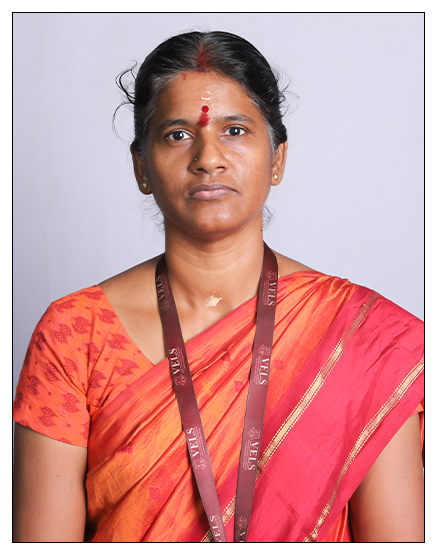 |
| 4 | Dr.Jayalakshmi.V | MCA., M.Phil., NET., SET., Ph.D. | Wireless Network, Image Processing & Data Mining and Big Data | 23 years | Professor | 70 |  |
|
| 5 | Dr.Sumalatha.V | MCA.,M.Phil(CS)., Ph.D.,SET. | Machine Learning , Cloud computing, Data Science, Image Processing | 17 years 1 month | Associate Professor | 41 | 234081 | 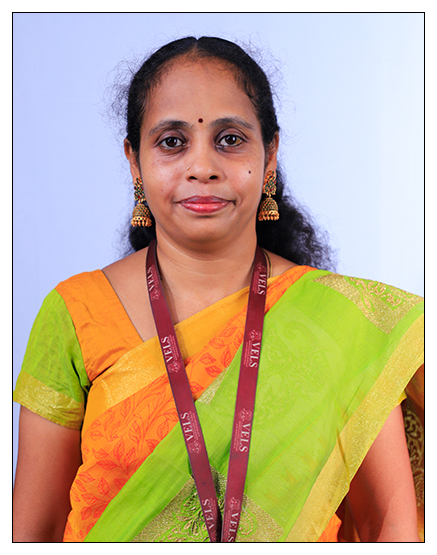 |
| 6 | Dr.Meenakshi.C | M.C.A., M.Phil., Ph.D., | Artificial Intelligence - NLP, ML | 18 years 1month | Associate Professor | 35 | 182243 | 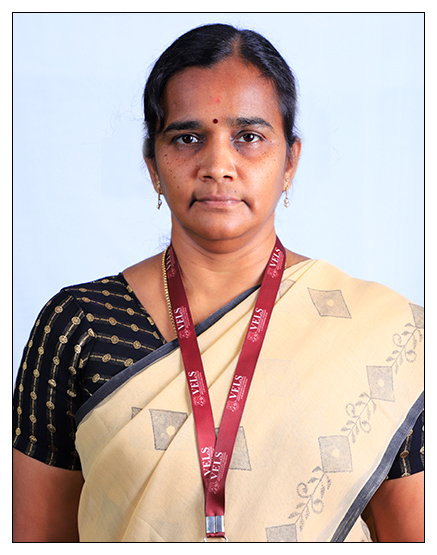 |
| 7 | Dr.Mahalakshmi.R | M.C.A., M.Phil., Ph.D., | Data Science, AI, ML, Deep Learning | 20years 5 months | Associate Professor | 8 | 468022 |  |
| 8 | Dr.Nagasundaram.S | M.C.A., M.Phil., Ph.D., | Cloud Computing, Software Engineering, | 18 years 1 months | Assistant Professor | 12 | 249872 |  |
| 9 | Dr.Kavitha.P | M.C.A., M.Phil., B.Ed., NET., Ph.D | Image Processing , Machine Learning | 10 years 7 months | Assistant Professor | 12 | 251133 |  |
| 10 | Dr.Lipsa Nayak | MCA., M.Phil., Ph.D | Big Data, Cloud Computing | 1 year 5 months | Assistant Professor | 10 | 467976 | 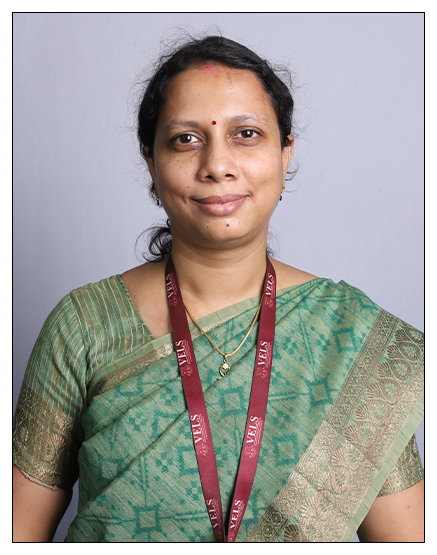 |
| 11 | Dr.Krithika.D.R | MCA.,M.Phil.,Ph.D | Big Data Analytics, Data Science, AI, ML, Data Mining | 1 year 5 months | Assistant Professor | 14 | 431400 | 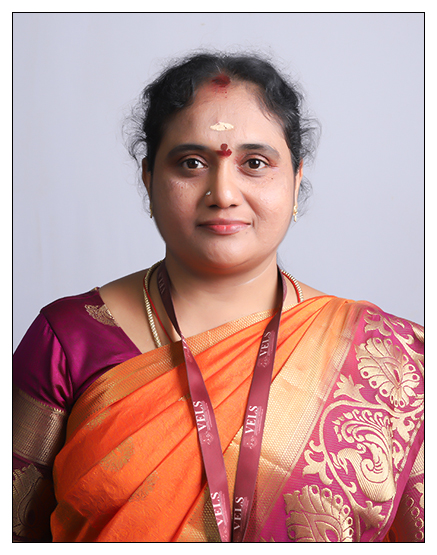 |
| 12 | Dr.Poongodi.A | MCA., M.Phil., Ph.D | Data Mining | 21 years 4 month | Assistant Professor | 9 | 431315 | 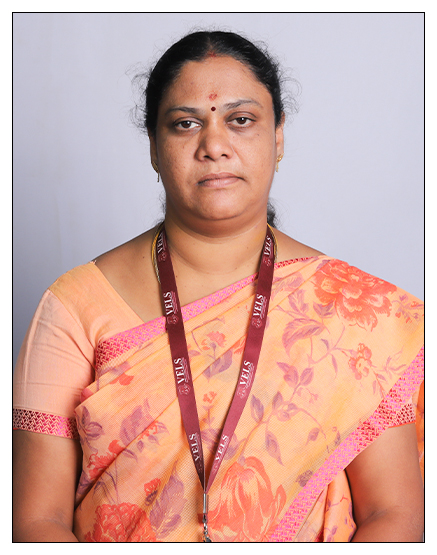 |
| 13 | Ms.Anu Priya.S | MCA., P.Phil.,M.Tech., (Ph.D.) | Data Mining , Machine Learning, Big Data | 13 years 2 months | Assistant Professor | 8 | 470314 | 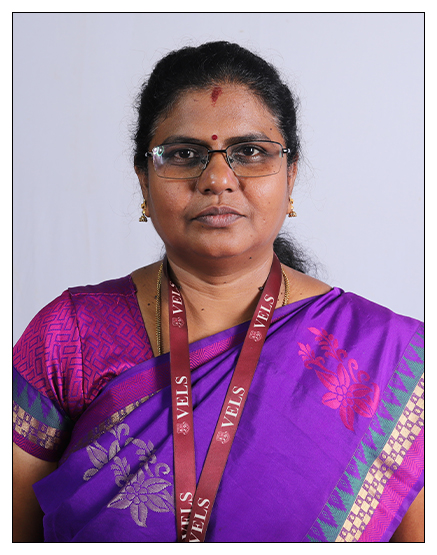 |
| 14 | Dr.Jayamangala.H | MCA., CS.,Ph.D | Data Science, ML | 12 years 4 months | Assistant Professor | 6 | 467973 |  |
 CHAT WITH A STUDENT
CHAT WITH A STUDENT